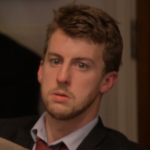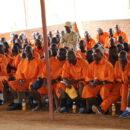South Sudan: A letter from Warrap State – Impossible Expectations
By Naomi Pendle
If you walk to the far side of the market, beyond the large cauldrons of cooking broth and the boys who can fix your peddle bike, you come to the village auction beneath an aging tree. As the 9th July approaches, the buyers are swelling around the selection of goats on offer. Everyone wants to be able to feast on Independence Day.
In South Sudan, “the 9th July” seems to punctuate every sentence, quoted as both the excuse and the hope. The phones in the market play the new national anthem. The local government has rushed to erect flagpoles in each village office. Plus, the end of each school day sees clumps of uniformed children practicing for parades. Here, amongst the ambling bush tracks and newly cultivated plots, few people could state with confidence the date of their birthday, but the 9th July is a known by even the smallest children.
As well as expectations of feasting, there are also endless hopes about the changes the 9th of July will bring. “The fighting will stop”, “the food will come back to the markets” and even “my daughter will be cured of malaria”. Whether in the lavish Land Cruisers of the government ministers, or under the grass roofs of the remotest villages in Warrap State, the 9th July is crammed with predictions of new possibilities. Having seen fifty years of almost constant civil war, people feel they have paid the cost for what is promised.
The expectations for separation were expressed in the lack of reservation shown in Warrap State during the January referendum. Locally, the only person who voted for unity later admitted her mistake – claiming that she did not want to confess ignorance when international observers were in the polling station, she had just made a mark at random and posted her ballot.
Yet, in many ways, the 9th July will bring continuity and not change in government in these rural parts. While a new flag will be raised and a new country will be present on the international stage, for decades the Dinka villages of Warrap State have had the de facto leadership of the SPLA/M. While urban areas largely remained under Northern control, these villages submitted to the SPLA early in the war. With Kerbino Kwanyin (the founder of the SPLA), Salva Kiir (the current President of South Sudan) and other senior military figures born beneath its thatched roofs, the Dinka of Warrap join several other communities in South Sudan in claiming to have contributed the most to the fight for Southern freedom. With the Government of South Sudan (GOSS) conspicuously dominated by the SPLM, the surviving same figures will retain power.
It is the promise of peace that accompanies independence, and not a change in leadership itself, that has brought alterations. As you leave the town of Wau for the villages of Pathuon West, when the fuel prices are not so high, a sporadic flow of clunking commercial vehicles and trucks will take you the couple of hours journey along the red gravel road. Three years before the journey was made over a day through bush tracks and was the monopoly of the bravest truck drivers. Now the rural dawn breaks above a trail of uniformed pupils walking to NGO built classrooms. Even cartons of fruit juice, as well as little bottles of whiskey, can be found in the remotest markets. The last six years of peace has allowed expectations to start being met.
Yet the expectations of what independence will bring are too high and too diverse to ever be simultaneously implemented. Even at the most macro level some await their reward for their wartime contributions while others expect a new peacetime nation focused on development irrespective of wartime happenings. Some reject the inclusion of previous dissenters into the contemporary leadership, while others are content to experience the dividend it brings.
Leaning on his shining blue motorbike beneath the mango tree in the middle of the market, Deng is a second year student home from his study in the University of Juba. With funding for Higher Education shifting this year from Khartoum to the South, it seems that the earliest the universities will open is four months after the due start date. The students are left to wait unsure if their universities will have the funding and staff to resume. The student is privately fully aware that the changes on the 9th July might not all be as positive as is publicly anticipated.
The real challenge for the new state of South Sudan will be the management of expectations. The dominance of the SPLM/A means that there is little space for public expression of discontent. Uncertainties about the fruits of independence are uttered privately. Even non-partisan alternative sources of power and authority, such as chiefs and youth leaders, are united in their confession that they are dependent on the SPLM government. Both financially and for security reasons, they would not act in defiance of them.
Instead, conflicts arising from failed expectations have already gained violent expression. A search at the end of June might have removed hundreds of weapons from Juba, but they still remain across these villages. Listening to the old radio left from the North-South war, the young Dinka man hides in his tukal (thatched hut) seeking the news from the toc (grazing lands). With an attack on neighbouring Twic County just a couple of days before, allegedly Gadet’s rebel troops have been sighted amongst the Dinka Apuk’s own pastures. Video footage of his forces hears them singing of “coming to Yiikador” – a village deep inside Apuk Dinka lands. Rumours run wild about the intentions of these troops, but tension seems to be mounting as the 9th approaches. It was only a month ago that they apparently caused over a hundred deaths in Gogrial East County. Having fought through the civil war for the ideal of separation, Gadet’s confidence that the 9th July will not meet his expectations has caused him to battle.
Yet, for now, the toc is a vacuum of SPLA soldiers. The Dinka Apuk’s untrained Titweng (teenage cattle guards) are the only armed group in the toc. With SPLA/M loyalty running so high amongst the communities of Warrap State, there is a willingness to let the Titweng defend alone. If the rebel troops of Gadet come, the Titweng are assumed to be relied upon to do all they can to expel them. Furthermore, there is no promise that this situation will change post the 9th, and that the new Southern government will have the ability or inclination to increase security. Therefore, as one youth privately points out, “the peace of 2005 did not even really bring peace”. South-South violence has only escalated in the last six years and might get worse after the 9th.
In the last six years since the CPA, the broad nature of the SPLA/M has allowed much violent conflict to be avoided. The leadership has intentionally fashioned an inclusive party. Plus, the post-Garang leadership’s unrelenting support of separation has drawn more Southerners to the movement. Attempting to avoid public or violent expressions of discontent including many on the inside allowed private arguments. Yet, with independence bringing an end to the desire for separation, it is unclear that any other aspiration will allow so many to be held within its ranks. South-South divisions long pervaded the dynamics of the North-South war, with more people dying in civil Southern conflict than against Khartoum’s armies. Yet, the peacetime administration and the apparent ethnic nature of politics have caused further alienation even amongst Dinka groups at the heart of the wartime SPLA.
Whatever the international community wants from the independence of South Sudan, there is also the danger that its expectations will be thwarted. The compliance of GOSS to the demands of international players has often been internally justified by the 9th July and the necessity of international recognition of this day. While GOSS will still be dependent on international support for security and development, the successful passing of the 9th July will weaken the benefits of obedience. Recent GOSS statements in relation to development spending indicate a desired change in current relations.
The 9th July and the independence of South Sudan is something new, crammed with expectations, predictions and uncertainties. This contemporary context of intense international support and a hidden realism amongst the population may allow South Sudan to exist together. Yet, many fear that the 9th will bring few changes to old experiences and that disappointment will mean that things fall apart before they’ve really started.
Naomi Pendle is currently teaching at the University of Bahr el-Ghazal (Wau) and Marol Academy (Warrap State). She has now lived and worked in this region of South Sudan for two years.






